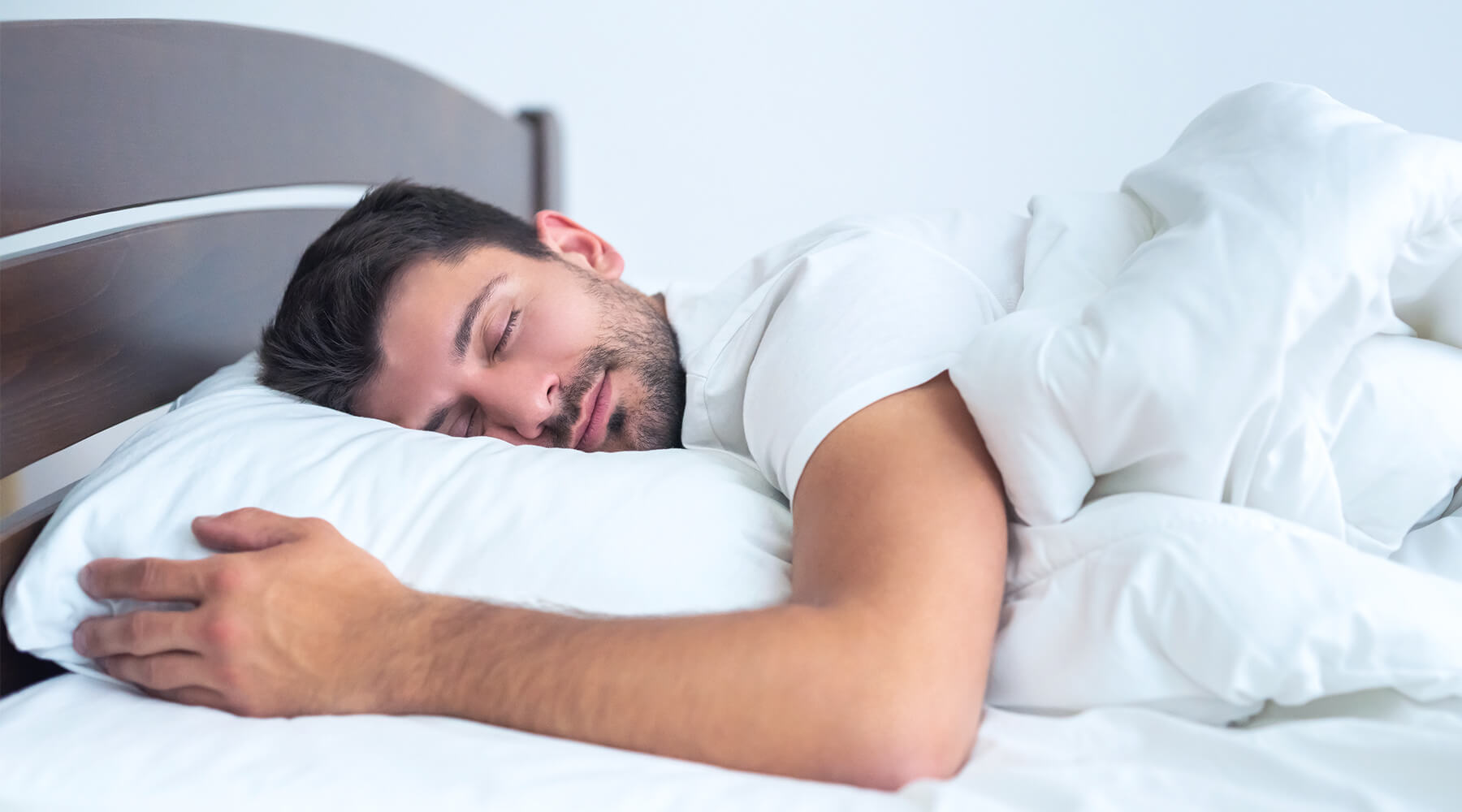
The nerve poison nicotine - why smoke is bothering sleep
Smokers sleep worse – but why? Cigarette smoke and the nicotine it contains are harmful to our health and have a negative impact on our sleep. Learn here how nicotine affects the body and why smoking not only hinders a healthy daily routine but also restful sleep.
Table of contents
- Health risk of smoking
- The neurotoxin nicotine
- How does nicotine work?
- How nicotine and smoking harm sleep
- Overview: The effect of nicotine on sleep
- Smoke-free for better sleep
1. Health risk of smoking
Nearly a quarter of Germans regularly smoke cigarettes, even though smoking is considered one of the greatest preventable health risks for us humans and causes serious long-term damage to both the body and the psyche. Nicotine, the main active ingredient, in particular, affects the organism in a variety of harmful ways and not only leads to strong addiction, but also prevents restful sleep and promotes the development of Sleep disorders.
2. The neurotoxin nicotine

Nicotine is a naturally occurring chemical compound and is considered like alcohol or caffeine It is one of the so-called neurotoxins. It is found naturally, particularly in the leaves of the tobacco plant, and is thus one of the main active ingredients in all tobacco products and cigarettes. A standard cigarette contains up to 13 mg of nicotine, of which between 1 and 2 mg is absorbed directly into the body through smoking. Due to its stimulating effect on the human organism and various parts of the nervous system, nicotine can impair health in a variety of ways and can also significantly disrupt our sleep.
3. How does nicotine work?
After inhalation, nicotine reaches the brain within seconds and activates the so-called reward system, increasing the production of the "happy hormone" dopamine. This triggers feelings of relaxation and well-being, which are largely responsible for the substance's dangerously addictive potential. Although nicotine takes effect quickly, it is broken down just as quickly and must then be replenished to maintain its effect.

Nicotine is called a "nerve poison" for a reason! Nicotine primarily triggers stress in the body and stimulates the release of the stress hormones noradrenaline, adrenaline, or vasopressin. This puts our body on alert, causing heart rate and blood pressure to rise, blood vessels to constrict, and the nervous system to be activated. Repeated nicotine consumption therefore repeatedly puts our body into a state of stress, which, in the long term, particularly impairs our nerve function and cardiovascular system suffer. And that's not all, because nicotine also interferes with lipid metabolism and the regulation of blood sugar levels, damages the gastrointestinal system, and promotes the activation of carcinogenic substances.
4. How nicotine and smoking harm sleep
Smokers have difficulty falling asleep, sleep for shorter periods of time, and are less restful – this has been proven by scientific studies and surveys. According to the studies, regular cigarette consumption makes it difficult to fall asleep, reduces the quality of sleep and the feeling of rest the next morning, and overall causes a significantly shorter sleepThe study of brain activity in smoking subjects showed that they spend comparatively less time in deep sleep, but longer time in a lighter sleep state than non-smoking subjects.
The reason for this is certainly the interaction of the various active substances that are absorbed by the body when smoking. Nicotine, the main active ingredient, in particular, stimulates the nerves and impairs important bodily functions such as metabolism, hormone production, and the cardiovascular system. natural sleep rhythm disrupted and our bodies are prevented from properly resting and falling asleep. Furthermore, the shortened deep sleep prevents the body and brain from regenerating sufficiently during the night. Last but not least, lung function and the respiratory tract also suffer from the harmful smoke, preventing free breathing during sleep. snoring Statistically, smokers also smoke more often, which also has a negative impact on sleep.

5. Overview: The effect of nicotine on sleep
- Difficulty falling asleep: Nicotine activates the nervous system and puts the body under stress, which prevents evening relaxation and keeps those affected awake longer.
- Reduced sleep duration/lack of sleep: Nicotine disrupts the natural sleep-wake rhythm and shortens the duration of nighttime sleep
- Poor sleep/Reduced sleep quality: The neurotoxin appears to have a negative effect on the transition between sleep phases, particularly at the beginning of the night, and to reduce the overall proportion of deep sleep, which reduces sleep quality and makes sleep less restful.
6. Smoke-free for better sleep
Smoking affects our health and further harms it by significantly impairing sleep. Sleep disorders and insomnia cause us to Day under fatigue, poor performance, and stress. This, in turn, is harmful to health and makes sleep even more difficult – which increases the craving for the relaxing effects of nicotine. It's a vicious circle that we should avoid at all costs. So, to ensure we not only sleep well but also live a long and healthy life, we should abstain from smoking in any form or at least try to reduce our nicotine consumption to a minimum.
7. Conclusion
-
Smoking is one of the greatest health risks and not only reduces the quality of life, but also promotes sleep disorders and insomnia, which are further detrimental to health.
-
Nicotine is a neurotoxin which, as the main active ingredient in tobacco products, has a particularly harmful effect on nervous function and the cardiovascular system and is highly addictive.
-
Nicotine causes difficulty falling asleep, shortens sleep duration and makes sleep less restful.
Best wishes and see you soon!



Leave a comment
This site is protected by hCaptcha and the hCaptcha Privacy Policy and Terms of Service apply.